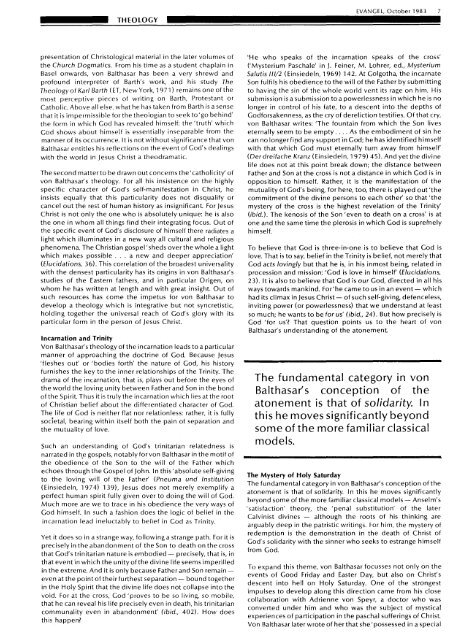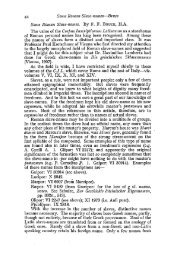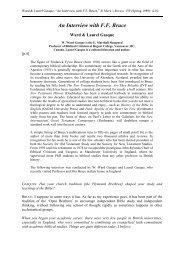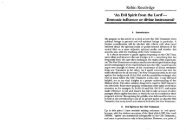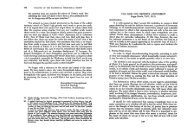Hans Urs von Balthasar: The Paschal Mystery - TheologicalStudies ...
Hans Urs von Balthasar: The Paschal Mystery - TheologicalStudies ...
Hans Urs von Balthasar: The Paschal Mystery - TheologicalStudies ...
You also want an ePaper? Increase the reach of your titles
YUMPU automatically turns print PDFs into web optimized ePapers that Google loves.
THEOLOGY<br />
presentation of Christological material in the later volumes of<br />
the Church Dogmatics. From his time as a student chaplain in<br />
Basel onwards, <strong>von</strong> <strong>Balthasar</strong> has been a very shrewd and<br />
profound interpreter of Barth's work, and his study <strong>The</strong><br />
<strong>The</strong>ology of Karl Barth (ET, New York, 1971) remains one of the<br />
most perceptive pieces of writing on Barth, Protestant or<br />
Catholic. Above all else, what he has taken from Barth is a sense<br />
that it is im permissible forthe theologian to seek to' go behind'<br />
the form in which God has revealed himself: the 'truth' which<br />
God shows about himself is essentially inseparable from the<br />
manner of its occurrence. It is not without significance that <strong>von</strong><br />
<strong>Balthasar</strong> entitles his reflections on the event of God's dealings<br />
with the world in Jesus Christ a theodramatic.<br />
<strong>The</strong> second matter to be drawn out concerns the' catholicity' of<br />
<strong>von</strong> <strong>Balthasar</strong>'s theology. For all his insistence on the highly<br />
specific character of God's self-manifestation in Christ, he<br />
insists equally that this particularity does not disqualify or<br />
cancel out the rest of human history as insignificant. For Jesus<br />
Christ is not only the one who is absolutely unique: he is also<br />
the one in whom all things find their integrating focus. Out of<br />
the specific event of God's disclosure of himself there radiates a<br />
light which illuminates in a new way all cultural and religious<br />
phenomena. <strong>The</strong> Christian gospel 'sheds overthe whole a light<br />
which makes possible ... a new and deeper appreciation'<br />
(Elucidations, 36). This correlation of the broadest universality<br />
with the densest particularity has its origins in <strong>von</strong> <strong>Balthasar</strong>'s<br />
studies of the Eastern fathers, and in particular Origen, on<br />
whom he has written at length and with great insight. Out of<br />
such resources has come the impetus for <strong>von</strong> <strong>Balthasar</strong> to<br />
develop a theology which is integrative but not syncretistic,<br />
holding together the universal reach of God's glory with its<br />
particular form in the person of Jesus Christ.<br />
Incarnation and Trinity<br />
Von <strong>Balthasar</strong>'s theology of the incarnation leads to a particular<br />
manner of approaching the doctrine of God. Because Jesus<br />
'fleshes out' or 'bodies forth' the nature of God, his history<br />
furnishes the key to the inner relationships of the Trinity. <strong>The</strong><br />
drama of the incarnation, that is, plays out before the eyes of<br />
the world the loving unity between Father and Son in the bond<br />
of the Spirit. Thus it is truly the incarnation which lies atthe root<br />
of Christian belief about the differentiated character of God.<br />
<strong>The</strong> life of God is neither flat nor relation less: rather, it is fully<br />
sodetal, bearing within itself both the pain of separation and<br />
the mutuality of love.<br />
Such an understanding of God's trinitarian relatedness is<br />
narrated in th.e gospels, notably for <strong>von</strong> <strong>Balthasar</strong> in the motif of<br />
the obedience of the Son to the will of the Father which<br />
echoes through the Gospel of John. In this'absolute self-giving<br />
to the loving will of the Father' (Pneuma und Institution<br />
(Einsiedeln, 1974) 139), Jesus does not merely exemplify a<br />
perfect human spirit fully given over to doing the will of God.<br />
Much more are we to trace in his obedience the very ways of<br />
God himself. In such a fashion does the logic of belief in the<br />
incarnation lead ineluctably to belief in God as Trinity.<br />
Yet it does so in a strange way, following a strange path. For it is<br />
precisely in the abandonment of the Son to death on the cross<br />
that God's trinitarian nature is embodied - precisely, that is, in<br />
that event in which the unity of the divine life seems imperilled<br />
in the extreme. And it is only because Father and Son remaineven<br />
at the point of their furthest separation - bound together<br />
in the Holy Spirit that the divine life does not collapse into the<br />
void. For at the cross, God 'proves to be so living, so mobile,<br />
that he can reveal his life precisely even in death, his trinitarian<br />
communality even in abandonment' (ibid., 402). How does<br />
this happen?<br />
EVANGEL, October 1983 7<br />
''He who speaks of the incarnation speaks of the cross'<br />
(' Mysterium <strong>Paschal</strong>e' in J. Feiner, M. Lohrer, ed., Mysterium<br />
Salutis 111/2 (Einsiedeln, 1969) 142. At Golgotha, the incarnate<br />
Son fulfils his obedience to the will of the Father by submitting<br />
to having the sin of the whole world vent its rage on him. His<br />
submission is a submission to a powerlessness in which he is no<br />
longer in control of his fate, to a descent into the depths of<br />
Godforsakenness, as the cry of dereliction testifies. Of that cry,<br />
<strong>von</strong> <strong>Balthasar</strong> writes: '<strong>The</strong> fountain from which the Son lives<br />
eternally seem to be empty .... As the embodiment of sin he<br />
can no 10ngerfi(1d any support in God; he has identified himself<br />
with that which God must eternally turn away from himself'<br />
(Der dreifache Kranz (Einsiedeln, 1979) 45). And yet the divine<br />
life does not at this point break down; the distance between<br />
Father and Son at the cross is not a distance in which God is in<br />
opposition to himself. Rather, it is the manifestation of the<br />
mutuality of God's being, for here, too, there is played out 'the<br />
commitment of the divine persons to each other' so that 'the<br />
mystery of the cross is the highest revelation of the Trinity'<br />
(ibid.). <strong>The</strong> kenosis of the Son 'even to death on a cross' is at<br />
one and the same time the plerosis in which God is supremely<br />
himself.<br />
To believe that God is three-in-one is to believe that God is<br />
love. That is to say, belief in the Trinity is belief, not merely that<br />
God acts lovingly but that he is, in his inmost being, related in<br />
procession and mission: 'God is love in himself' (Elucidations,<br />
23). It is also to believe that God is our God, directed in all his<br />
ways towards mankind. For'he came to us in an event - which<br />
had its climax in Jesus Christ - of such self-giving, defenceless,<br />
inviting power (or powerlessness) that we understand at least<br />
so much; he wants to be for us' (ibid., 24). But how precisely is<br />
God 'for us'? That question points us to the heart of <strong>von</strong><br />
<strong>Balthasar</strong>'s understanding of the atonement.<br />
<strong>The</strong> fundamental category in <strong>von</strong><br />
<strong>Balthasar</strong>'s conception of the<br />
atonement is that of solidarity. In<br />
this he moves significantly beyond<br />
some of the more familiar classical<br />
models.<br />
<strong>The</strong> <strong>Mystery</strong> of Holy Saturday<br />
<strong>The</strong> fundamental category in <strong>von</strong> <strong>Balthasar</strong>'s conception of the<br />
atonement is that of solidarity. In this he moves significantly<br />
beyond some of the more familiar classical models - Anselm's<br />
'satisfaction' theory, the 'penal substitution' of the later<br />
Calvinist divines - although the roots of his thinking are<br />
arguably deep in the patristic writings. for him, the mystery of<br />
redemption is the demonstration in the death of Christ of<br />
God's solidarity with the sinner who seeks to estrange himself<br />
from God.<br />
To expand this theme, <strong>von</strong> <strong>Balthasar</strong> focusses not only on the<br />
events of Good Friday and Easter Day, but also on Christ's<br />
descent into hell on Holy Saturday. One of the strongest<br />
impulses to develop along this direction came from his close<br />
collaboration with Adrienne <strong>von</strong> Speyr, a doctor who was<br />
converted under him and who was the subject of mystical<br />
experiences of participation in the paschal sufferings of Christ.<br />
Von <strong>Balthasar</strong> later wrote of her that she' possessed in a special


